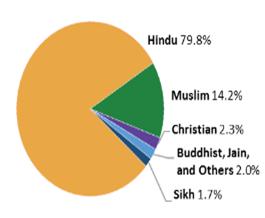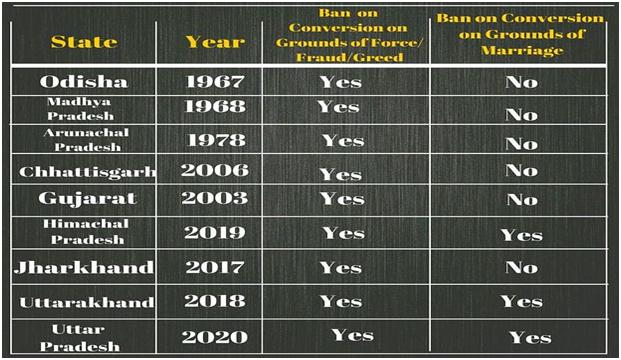

India historically touts itself as a secular state, one where all religions are recognized and can peacefully co-exist. Unfortunately, the reality is much different. Recent issues such as exodus of Kashmiri Hindus, cow slaughtering, love jihad paints a gloomy picture of India.
This article examines moral panics about religious violence (love jihad) and other issues in contemporary India.
Context
India historically touts itself as a secular state, one where all religions are recognized and can peacefully co-exist. Unfortunately, the reality is much different. Recent issues such as exodus of Kashmiri Hindus, cow slaughtering, love jihad paints a gloomy picture of India.
This article examines moral panics about religious violence (love jihad) and other issues in contemporary India.
Background
- In the knowledge tradition of India, ethics has its origin in its religious and philosophical thinking. From time immemorial, various religious faiths have flourished here.
- Every religious and every philosophical system of India has a prominent ethical component.
- Ethics is the core of all these systems. In every religious tradition, good moral conduct is considered essential for a happy and contented life.
- Without following the path of righteousness no one can attain supreme goal (mok?a) of life. For this one has to perform good deeds and avoid wrong-doing.
- However, today the situation has changed completely. Today, the Indian society is dominated by religious conflicts of serious nature.
- A huge and diverse land of 135 million people, 29 states and 22 scheduled languages, yet the country is caught in a single obsession-‘religion’.
Analysis
What is religious freedom?
- Religious freedom is the right of people to heed the call of conscience in matters of religion and belief, living out its dictates openly, peacefully, and without fear.
- It is a broad and inclusive right that requires protection of the allied rights of expression, association, and assembly.
- No individual or entity has the right to force others to act against their conscience or prevent them from answering its call in a peaceful manner.
|
Important facts
|
Religious Freedom Protections and Concerns
- Articles 25 to 28 in the Constitution of India provide the right to freedom of religion.
|
Article 25 |
Article 26 |
Article 27 |
Article 28 |
|
It imparts freedom of conscience and free profession, practice and propagation of religion. |
It gives freedom to manage religious affairs. |
It sets freedom as to payment of taxes for promotion of any particular religion. |
It gives freedom as to attendance at religious instruction or religious worship in certain educational institutions. |
|
It is available to persons. |
It is available to religious denominations. |
It is available to a person against religious denomination(s). |
It is applicable to educational institutions. A person can invoke it. |
- Article 25 of the Indian Constitution states that "all persons are equally entitled to freedom of conscience and the right freely to profess, practice and propagate religion" in a manner that does not adversely affect public order, health, or morality.
- India's federal law provides "minority community" status for six religious groups—Buddhists, Christians, Jains, Muslims, Parsis (Zoroastrians), and Sikhs—that together comprise about one-fifth of India's population.
- The laws state that the government will protect the existence of these minorities and encourage conditions for the promotion of their individual identities.
- The Preamble to the Indian Constitution has the word “secular”.
|
The confused State
|
- Further, Article 26 says that all denominations can manage their own affairs in matters of religion. Religious organisations can be banned for sedition or disturbing communal harmony.
|
Right to conscience
|
Anti-conversion laws
The trend for communalisation of the issue of conversion is not new and has been sustained over the last 50 years in postcolonial India. Though, freedom of religion is basic to these articles of the Constitution, but in the last few decades in general and recent years in particular, the degree of religious freedom in India has declined.
- For instance, ten states have introduced so-called “anti-conversion” laws.
- Odisha was the first state that enacted an anti-conversion law — the Orissa Freedom of Religion Act 1967, passed in 1968.
- Gujarat passed its own version of the law in 2003, prohibiting conversions from one religion to another by the use of “force, allurement, or fraudulent means”.
- In 2006, Rajasthan passed a similar Bill but the Governor did not give assent to it because of complaints from minority communities.
- In the same year, Tamil Nadu repealed the anti-conversion legislation passed in 2002 due to protests by Christian minorities.
- Similar kind of legislation was passed in Jharkhand in 2017, Uttarakhand in 2018, Himachal Pradesh in 2019.
- In 2020, the Uttar Pradesh government further entrenched “communalism by law” in the state by activating The Uttar Pradesh Prohibition of Unlawful Conversion of Religious Ordinance, 2020.
- After UP, Madhya Pradesh became the latest state to pass an ordinance prohibiting forced religious conversion to check what it calls ‘love jihad’.
Religious conversion in States
Intersection of Special Marriage Act and ‘Love Jihad’
- The Uttar Pradesh government has already cleared a lawagainst forceful religious conversions.
- The law, however, is now being used to target consenting interfaith couples, including those whose parents’ agree to the marriage.
- Other states, such as Madhya Pradesh and Haryana, are now contemplating laws on ‘Love Jihad’ or ‘anti-conversion’, which use the garb of forced conversions to target inter-faith marriages and require individuals to take special permissions if they wish to convert their religion in order to marry under personal laws.
- Contrary to the premise of the Special Marriage Act that accepts the existence of interfaith relationships, the current ‘Love Jihad’ laws create scenarios that suggest that every case of inter-faith marriage is actually a case of forced conversion.
- All in all, the discourse around marriage in India ceases to place adult individuals at the center.
- Familial and societal forces have always played a role in deciding young people’s futures.
- By making the implementation of the Special Marriage Act so complex, the law is further complicating the lives of young people who have decided to choose their own partners.
- Lastly, the attitude of the law is reflected in the name of the act itself — the ‘Special’ Marriage Act.
- A marriage that is deemed special because it is seen as an anomaly, something that is out of the ordinary and deserves constant scrutiny.
What is adding to the challenge?
- Shameful conduct of leaders: Communal leaders mainly are behind these riots.
- Corrupt media: The real duty of media was to impart education, eradicate narrow-mindedness in people, put an end to communal feelings, encourage mutual understanding, and create a common Indian nationalism. But they have turned their main business to spread ignorance, preach narrowness, create prejudice, lead to rioting and destroy Indian common nationalism.
- Economic failure: If one looks for the roots of these communal riots, the reason seems to be economic (poverty, unemployment).
Ethical concerns
- Privacy: It raises concerns about the privacy of individuals who wish to adopt other religions.
- Liberty: Not to mention the liberty of an individual to choose a partner from another religion.
- Freedom: It undermines the free choice of adult women by referring to terms like “allurement”. It fails to see that in matters of love, faith is secondary, and the choice is primary.
- Criminalization: Excessive legislation only criminalises everyday acts.
The role of ethics in religion
- Religion has a high impact on the worldviews of individuals and societies. It has been the brain behind the ethics that govern individuals and communities globally.
- Most religions have an ethical component. It is significantly broader than the common conception of analyzing right and wrong. Ethics deals with ideas such as Right, Good and Duty and these concepts were discussed in ancient Greece by Plato and Aristotle in the 3rd & 4th Century BCE.
- A central aspect of ethics is "the good life", the life worth living or life that is simply satisfying, which is held by many philosophers to be more important than traditional moral codes.
- Revealed religions like Zoroastrianism, Judaism, Christianity and Islam do prescribe some clear and unambiguous rules to follow. If their scriptures were authored or dictated by God, then the commands in them are God's own commands. They cannot be changed if human circumstances change or ethical ideas progress.
- If religion has a role in moral decision-making, then what should be that role? In America, for many individuals, their religion is a centrally defining characteristic of who they are, such that they would be nearly incapable of making ethical decisions independently of their religious beliefs.
- The link between religion and morality is best illustrated by the Golden Rule. Virtually all of the world’s great religions contain in their religious texts some version of the Golden Rule: “Do unto others as you would wish them do unto you”. In other words, we should treat others the way we would want to be treated. This is the basic ethic that guides all religions. If we do so, happiness will ensue.
How to cure religious violence?
- If there is to be any lasting solution to all these communal riots, it lies only in the improvement in the economic condition of the country; because the economic condition of the common people is so degraded.
- Furthermore, religious violence can be cured by deeper understanding of religion. An international campaign must be launched to teach people to respect other religions.
- If the generation is being taught that Christians are disbelievers, Muslims are terrorist, Hindus are extremist. Then what could be expected? We are pouring hate in them and we will get hate out of them.
- Every religion needs to respect other religions, despite the differences. It doesn’t matter if there god is different from ours, we must be tolerant towards others.
Conclusion
The condition of Bharatvarsha/India is indeed pitiable today. The devotees of one religion are sworn enemies of the devotees of another religion. Though India advertises itself as a ‘multi-religious’ democracy, the situation is quite different today. By claiming itself an adherent to global norms, it also aspires to be on the table of global rule making. However, for a country with such stated ambitions, its record on religious freedom is deeply disconcerting. The catalogue of religious violence, incitement and wrecking of the rule of law in several parts of the country remains an unsettling fact. The country needs to understand that ‘rule of law’ and ‘communal harmony’ are essential for any functional democracy.




